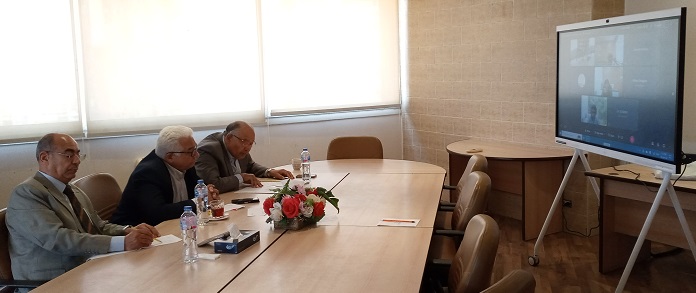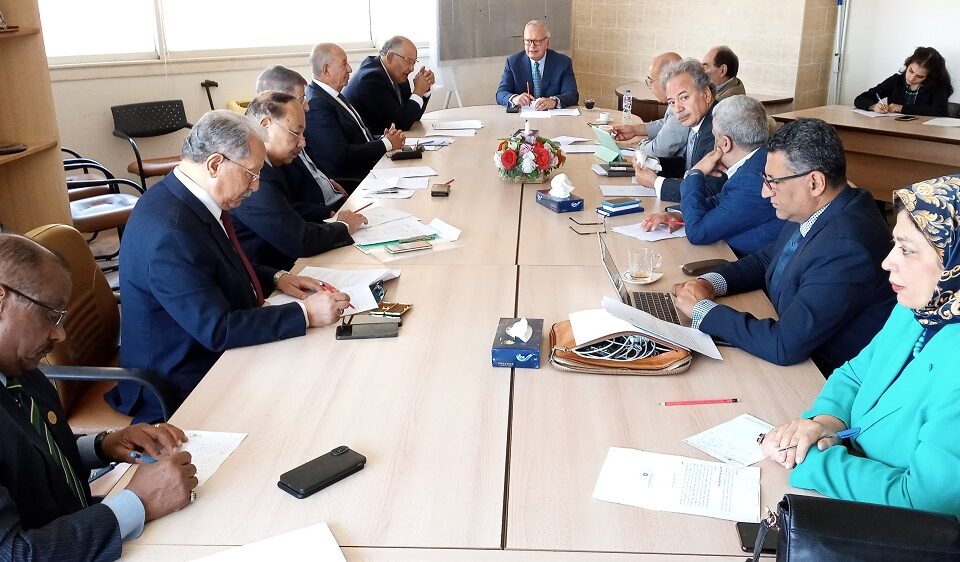Chairman
January 11, 2023Ayman Mohamed Adly
January 18, 2023
On January 17, 2023, ECFA hosted His Excellency the Secretary-General of the League of Arab States, Ahmed Aboul Gheit, who presented the international state of affairs, the challenges it entails, its effects on the Arab world, and the ways available to address them. The meeting was opened by Ambassador Mohamed El-Oraby, ECFA Chairman, and was attended by many ECFA members, experts and researchers interested in following up and extrapolating international and regional developments.
His Excellency the Secretary General noted that the current international situation, specifically represented in the Russian-Ukrainian war, is perhaps the most dangerous situation the world has witnessed over the past 75 years. Although it is close to the Korean situation in the early 1950s, as well as the Cuban crisis in the early 1960s, these crises were controlled, thanks to the guidance of the concerned leaders at the time, in contrast to the current crisis which pace is dramatically accelerating between Russia and the West, leading to talk about not ruling out the use of tactical nuclear weapons, which threatens international peace and security, and even the entire world order. Among the dangers that the world currently faces is the spiraling towards the end of the unipolar global order, represented by the United States, and the U.S. conflict with the rising Chinese power, which will lead to falling into the “Thucydides Trap,” and also to the inevitable occurrence of a new Cold War.
In addition, there are some significant developments that would enhance the scenario of confrontation on the global scene, most notably the following: Germany announced several months ago that it would increase its defense budget to 100 billion euros, and this raises questions about the impact of this on NATO on the one hand, and on the European Union on the other hand, especially after Brexit, and even on the international scene; China’s ambition to double its nuclear capabilities, amid American warnings that Beijing seeks to possess a “nuclear superpower”; The tremendous avancement in North Korea’s nuclear weapons and its ongoing challenges and provocations; Announcing the “AUKUS” alliance among Australia, Britain, and the United States, and holding joint exercises between India and Japan for the first time during January 2023. It is expected that any potential use of nuclear weapons will not be limited to two parties; meaning that if there is a nuclear confrontation between Russia and the West, there will be a Russian-Chinese, or Chinese-Western nuclear confrontation; as logic entails that a nuclear power will not allow itself to be subjected to the control of another power that has a larger strategic stock of nuclear weapons. This undoubtedly puts the future of all humanity at stake.
Regarding the regional situation, it is very dangerous, especially since the Russian-Ukrainian war and its developments have direct repercussions on the Arab region by virtue of its geographical proximity. The situation could get worse if a nuclear confrontation breaks out between Russia and the West. The Arab League tried to mediate to resolve the Russian-Ukrainian crisis, and the League’s Ministerial Council took a decision on March 9, 2022 to establish an Arab contact group for this purpose, but that mediation was not destined to succeed, like many other mediations offered by a number of other international actors.






